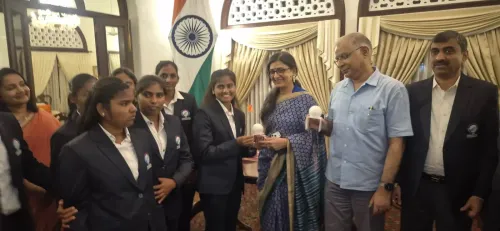Could Better Communication Have Prevented India's Loss to South Africa in Kolkata?

Synopsis
Key Takeaways
- Communication is vital for guiding inexperienced players.
- Improving technical skills is essential for adapting to challenging pitches.
- Young players must refine their foot movement and shot selection.
- Increased domestic cricket exposure can boost confidence.
- Focus on skill development over blaming conditions.
New Delhi, Nov 17 (NationPress) Former Indian leg-spinner Amit Mishra stated that the team's 30-run defeat against South Africa in the first Test at Eden Gardens was primarily due to a lack of effective communication and insufficient direction for the younger batting unit. He also mentioned that a hasty approach during critical batting moments contributed to the loss.
India was dismissed for 93 runs while attempting to chase down 124 for victory, as the first Test wrapped up in less than three days on a challenging pitch that exhibited inconsistent bounce from the outset. Neither team could score 200, with South African captain Temba Bavuma scoring an unbeaten 55, which was the highest individual score of the match.
"I believe there was a significant communication gap, and we needed to instruct the players on how to adapt their batting on a surface like that. It’s essential to provide proper guidance, especially to the younger players. The team lacked experience, and this necessitated better communication. This was a major factor because young players often display a rush of blood while batting. Hence, they require guidance," Mishra explained during an exclusive interview with IANS on Monday.
The loss in Kolkata revealed weaknesses in the Indian batting lineup on spin-friendly surfaces, reminiscent of their 3-0 defeat against New Zealand at home the previous year. South African spinners took 12 out of the 18 Indian wickets in the match, with off-spinner Simon Harmer receiving the player-of-the-match award for his total of eight wickets.
India also faced a setback with captain Shubman Gill retiring hurt in the first innings due to a neck injury, leaving them a batter short during the chase. Senior opener KL Rahul managed to score 39 in the first innings, marking the highest score by an Indian in the match. Mishra refuted the idea that the pitch was entirely to blame for the batting collapse, calling instead for players to enhance their technical skills and mental resilience.
"This is not the first time we've encountered such wickets, historically, previous captains have faced similar challenges, and matches have concluded within two to three days. I don’t believe the pitch is the main issue; it’s more about skill development. For example, when playing in England, one must adapt to swing and moisture. Therefore, enhancing both skill and mental preparedness is crucial," he asserted.
"This isn't the first time we've had such surfaces in India, and occasionally we find even better wickets available for play. Nonetheless, it’s vital to improve skill sets and understand strategies for batting on such pitches. The overall focus should be on fortifying the batting lineup," Mishra added.
Mishra emphasized that young batters need to refine their footwork and shot selection when playing on demanding pitches. "As I mentioned earlier, this is largely due to inexperience. They are a young team, and building a robust unit will take time. Many young players are part of this squad and need to manage their impulsiveness while batting,” he stated.
"It’s important to communicate effectively with them—senior players should engage with the younger ones, and coaches must provide guidance on enhancing their skills and the types of shots suitable for different wickets, as well as which balls to defend against," he elaborated.
"Footwork is crucial, especially on challenging wickets. When encountering such surfaces, it’s imperative to instruct players on foot movement and the appropriate shots to play or avoid, depending on the bowlers they face. This communication is essential, and I believe this talented young team will improve over time," Mishra concluded.
When asked if the lack of experience on spin-friendly surfaces in domestic cricket has impacted the batters' ability to handle turning tracks in Tests, especially given their heavy focus on white-ball formats, Mishra suggested that increased domestic matches during international breaks could bolster their confidence.
"There’s definitely a rush of blood in this team, and it’s essential to guide young players on managing that. Regarding domestic games, if opportunities arise to play in between international commitments, they should seize them as it can enhance confidence through scoring runs," he advised.
When questioned about whether India should create more balanced wickets instead of spin-friendly ones, Mishra concluded that skill development should take precedence over attributing blame to conditions.
"The focus must remain on improving skills. It’s easy to blame the wicket, but players must manage pressure, enhance their skills, and refine footwork. Only then can they learn how to score on challenging pitches. Prioritizing skill development is key before critiquing the conditions," he stated.
"It’s not unprecedented to see matches conclude in 2-2.5 days. So instead of blaming the pitch, we should reflect on how we can improve our performance on such surfaces. Questions should be raised about our bowling efficiency, running techniques, and batting prowess. Concentrating on these areas is essential.









